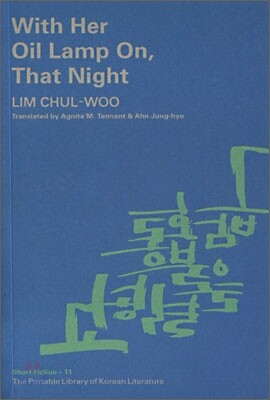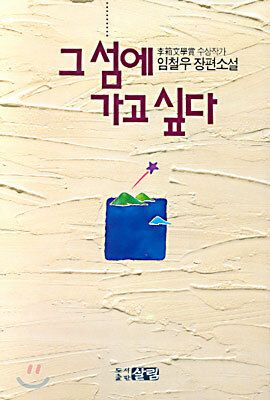Lim Chulwoo (born 1954) is a South Korean novelist.
Life
Born in 1954 on Wando Island, South Jeolla Province, Lim Chulwoo made his literary debut in 1981 by winning the Seoul Shinmun New Writer’s Contest for his short story "Gaedoduk" (개도둑 The Dog Thief). His debut work and some of the stories included in his collection Jikseongwa dokgaseu (직선과 독가스 Straight Lines and Poison Gas: At the Hospital Wards), as well as his five-volume novel Bomnal (봄날 A Spring Day), all feature the Gwangju Uprising as their subject matter. In the 1990s, Lim published Bulgeun san, huin sae (붉은 산, 흰 새 Red Mountain, White Bird), Geu seome gago sipda (그 섬에 가고 싶다 The Island) and other works dealing with the Korean War and the division of the two Koreas, using his hometown of Pyeongil-do as their backdrop. He has received the Korean Creative Writing Prize, the Yi Sang Literary Award, the Danjae Literature Prize, the Yosan Literary Award and Daesan Literary Award. Lim is Professor Emeritus of creative writing at Hanshin University.
Writing
Lim is considered one of the major "May writers," in that he deals with the Gwangju uprising of May 1980 as the literary subject matter of the greatest import. He has also been called the "discoverer of memories," as he brings the most tragic events of Korean history to the present. His refined, restrained prose full of lyricism spurs readers to keep turning the page.
During his childhood years in Pyeongil-do, Lim grew up with stories about the Korean War from adults who still talked about it with vivid immediacy. This is embodied in his first short story collection Abeojiui ttang (아버지의 땅 Father's Land), whose characters belong to the generation with second hand experience of the war. "Dwianeneun baramsori" (뒤안에는 바람소리 The Sound of Wind in the Back) tells the story of those who are killed by the police and the North Korean army; "Geunal bam horongbureul balkigo" (그날 밤 호롱불을 밝히고 With Her Oil Lamp on, That Night) describes how friendly neighbors become enemies overnight; "Father's Land" shows how people do not cultivate the land under which the bodies of those died in the war are buried, letting the grass grow taller and thicker. In "Gokdu undonghoe" (곡두운동회 The Illusory Field Day), the author represents the Bodo League Massacre committed in his hometown as a deceitful play.
The other great influence on Lim's writing is the Gwangju Uprising. Lim has said it is the first hand experience of the protest that made him a writer. The sense of survivor's guilt and trauma are well portrayed in his two works with the same title, "Bomnal," meaning "a spring day" in Korean. In the short story "Bomnal" (봄날 A Spring Day), because it was taboo to even mention Gwangju at the time, the incident remains implicit. However, through the narration of the protagonist Gilsu and the diaries of his friend Sangju, reality and imagination alternate, and the memories of the real event get clearer and clearer. The full-length novel Bomnal, published more than a decade after the short story, uses a documentary form incorporating a variety of materials and records, for a complete literary restoration of the uprising.
Lim wurde in einem Dorf auf der südkoreanischen Insel Wando geboren. Er studierte Englischen Sprache und Literatur an der Universität Sogang in Seoul. Später wechselte er auf die Universität Chonnam in Gwangju, wo er 1996 promovierte. Als Student erlebte er den Gwangju-Aufstand vom Mai 1980, bei dem Demonstranten durch das Militär umgebracht wurden. Die meisten Werke Lims beschäftigen sich mit dem Aufstand von 1980 und dem Koreakrieg als Hintergrund und analysieren die Schuldgefühle derer, die angesichts der politischen Unterdrückung und der Gewalt machtlos waren. Ein Jahr nach dem Gwangju-Massaker veröffentlichte er seine erste Kurzgeschichte Der Hundedieb, in der die Teilung des Landes und die Gewalttätigkeit der ideologischen Konflikte versprachlicht werden. Lims Ziel, die Tragödie des Aufstands zu dokumentieren, gipfelte in Frühlingstag, einem fünfbändigen Roman, der über einen Zeitraum von acht Jahren entstand.
Como profesional comenzó a escribir y publicar en 1981. Se ha centrado en reconstruir las experiencias dolorosas que vivieron los coreanos y en la realidad de las violentas represiones contemporáneas. Su obra testifica la violencia de los conflictos ideológicos y al mismo tiempo muestra la confianza en el ser humano a través de un estilo fluido y una trama excelente. La mayor parte de sus relatos tratan sobre el levantamiento de Gwangju y la Guerra de Corea, sucesos que le permiten explorar la psicología de la culpabilidad. La obra de Lim sobre el levantamiento de Gwangju cristalizó en Días de primavera, una novela en cinco volúmenes que escribió a lo largo de ocho años.
Lim Chulwoo est réputé pour être un auteur subversif6. Un an après le soulèvement de Gwangju en 1980, il publie sa première nouvelle intitulée Voleur de chien (Gae doduk), qui porte sur la division et la violence du conflit idéologique entre les deux Corées. La plupart de ses récits se concentrent sur le soulèvement de Gwangju et la Guerre de Corée, événements qui permettent à l'auteur d'explorer notamment la psychologie de la culpabilité. Son travail sur le soulèvement de Gwangju a abouti à l'écriture de Les jours du printemps (Bomnal), un roman en cinq volumes paru à huit ans d'intervalle.
1954年10月15日、全羅南道莞島郡に生まれる。全南大学校英文学、西江大学校英文学修士、全南大学校英文学博士課程を終えた。1981年、『ソウル新聞』新春文芸に『개도둑(犬泥棒)』が当選して登壇した。林の作品は南北分断の問題とイデオロギーの暴力性に焦点を合わせている。 『개도둑(犬泥棒)』、『직선과 독가스(直線と毒ガス)』、『붉은 방(赤い部屋)』などの作品は1980年代光州民主化運動を背景にした小説である。また、1990年代に入って発表した『그 섬에 가고 싶다(あの島に行きたい)』、『등대 아래서 휘파람(灯台の下で口笛)』、『붉은 산 흰 새(赤い山白い鳥)』などは林の故郷である平日島が背景で、朝鮮戦争と南北分断がテーマである。林は叙情的文体で小説を書く特徴があり、このため重いテーマでも読みやすいと言われている。 『그 섬에 가고 싶다(あの島に行きたい)』は映画化された。1995年から韓神大学校文芸創作学科教授として在職中。
임철우(1954~ )는 대한민국의 소설가다.
생애
임철우는 1954년 전라남도 완도군에서 태어났다. 부모님의 직장 문제로 어린 시절 부모님과 떨어져 섬에서 조부모와 살았다. 열한 살 때 가족들과 함께 광주로 이사했지만 도시 생활에 쉽게 적응하지 못했고, 부모의 무관심이 겹쳐져 오랜 시간 방황했다.
1973년 전남대학교 영문학과에 진학했고, 군대에 다녀온 뒤 5‧18광주민주화운동을 겪었다. 그는 극단 ‘광대’에서 단원들과 함께 황석영의 <한씨연대기>를 연습 중이었다고 한다. 계엄령이 내려진 후 친척집으로 피신했다가 다시 거리로 나와 시위의 참가인원, 사망자 수 등을 일지 형식으로 기록했다. 이 기록은 나중에 소설로 발표되었다.
1981년 《서울신문》 신춘문예에 단편소설 〈개도둑〉이 당선되어 데뷔했다. 데뷔작을 비롯하여 다섯 권 분량의 장편소설 《봄날》(1997-1998) 등 5‧18광주민주화운동을 소재로 한 작품들을 출간했다. 1990년대에는 고향인 평일도를 배경으로 6‧25전쟁과 분단의 문제를 다룬 《붉은 산, 흰 새》(1990), 《그 섬에 가고 싶다》(1991) 등을 출간하였다.
작가는 1995년부터 2016년까지 한신대학교 문예창작학과 교수로 재직했다.
작품 세계
5‧18광주민주화운동을 주요한 문학적 주제로 삼고 있다는 점에서 임철우는 대표적인 ‘5월 작가’로 꼽힌다. 한편으로는 한국 현대사의 가장 참혹한 사건들을 현재로 불러온 작가라는 점에서 ‘기억의 발굴자’라는 평가를 받기도 한다.
그의 초기 단편소설 〈봄날〉(1984)은 ‘광주’를 거론하는 것 자체가 금기시되던 발표 당시의 사정 때문에 광주에 대한 형상화가 선명하지 않지만 주인공 길수의 서술과 친구 상주의 일기를 통해 사실과 허구가 교차되면서 실제 사건의 기억을 점점 생생하게 이끌어내는 작품으로 평가된다. 단편소설 〈봄날〉로부터 10여 년 후에 완간된 장편소설 《봄날》(1997-1998)은 광주의 완전한 문학적 복원을 위해 다양한 자료와 기록을 동원하여 다큐멘터리 형식으로 재현되었다.
한편, 임철우가 자신의 작품 중 가장 애착이 가는 것 중 하나로 꼽은 소설인 단편소설 〈곡두운동회〉(1995)는 위장연극의 방식으로 자행된 보도연맹 학살사건을 변형된 형태로 재연한다. 이와 같은 ‘한국전쟁’의 모티프는 임철우의 유년기에 어른들에게 전해들은 일종의 추체험으로, 첫 번째 소설집 《아버지의 땅》(1984)에서 전쟁을 간접체험한 세대의 이야기로 나타난다. 작가는 비극적인 사건들을 단아하게 절제되어 있는 서정적인 문체로 표현하며 한국 전쟁이 지나간 자리에 남은 비극과 다양한 인간의 모습을 그려낸다.
주요 작품
1) 소설집
《아버지의 땅》, 문학과지성사, 1984.
《그리운 남쪽》, 문학과지성사, 1985.
《달빛 밟기》, 문학과지성사, 1987.
《직선과 독가스》, 대학사상사, 1989.
《황천기담》, 문학동네, 2014.
《연대기, 괴물》, 문학과지성사, 2017.
2) 장편소설
《붉은 산, 흰 새》, 문학과지성사, 1990.
《그 섬에 가고 싶다》, 살림, 1991.
《등대 아래서 휘파람》, 한양출판, 1993.
《봄날 1-5》, 문학과지성사, 1997-1998.
《등대》, 문학과지성사, 2002.
《백년여관》, 한겨레신문사, 2004.
《이별하는 골짜기》, 문학과지성사, 2010.
《돌담에 속삭이는》, 현대문학, 2019.
3) 산문집
《바람이 분다 떠나야겠다》, 책나무, 1989.
수상 내역
1984년 제17회 한국창작문학상
1988년 제12회 이상문학상
1998년 제12회 단재상
2005년 제22회 요산문학상
2011년 제19회 대산문학상 소설부문




